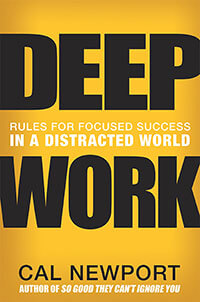
Author Cal Newport says people shouldn’t waste time on shallow work or social media, two activities that take little concentration, which is an extremely important skill.
In 2016, Cal Newport published Deep Work: Rules for Focused Success in a Distracted World. The associate professor of computer science at Georgetown University defines “deep work” as the “activity of focusing without distraction on a cogitatively demanding task,” he told New York Times author Tim Herrera in a recent article. “It describes, in other words, when you’re really locked into doing something hard with your mind.”

Cal Newport’s “Deep Work: Rules for Focused Success in a Distracted World”
Here’s a look at Newport’s four rules for working deeply, which he shared with Hererra:
Rule 1. Integrate deep work into your professional life. “You cannot just wait until you find yourself with lots of free time and in the mood to concentrate,” Newport told The New York Times. “You have to actively fight to incorporate this into your schedule.” Newport suggested including deep work blocks in one’s work calendar, just like any other important meeting or appointment.
Rule 2. Embrace boredom. “The broader point here is that the ability to concentrate is a skill that you have to train if you expect to do it well,” Newport said. Therefore, Newport suggests exposing oneself to boredom. “If you instead always whip out your phone and bathe yourself in novel stimuli at the slightest hint of boredom, your brain will build a Pavlovian connection between boredom and stimuli,” he said, which means your brain won’t be happy when you try to think deeply about something.
Rule 3. Quit social media — or at least be selective when it comes to your digital life, Newport said. “If you only focus on possible advantages [of using social media], you’ll end up, like so many of us today, with a digital life that’s so cluttered with thrumming, shiny knots of distraction” that distract us and impact our emotions, Newport said.
Rule 4. Get rid of shallow work — Newport’s term “for anything that doesn’t require uninterrupted concentration,” he explained. Such tasks include answering emails and scheduling appointments. If you allow your day to be dominated by this kind of work, Newport cautions that you’ll “never find time to do the deep efforts that really move the needle.”
More Career Advice
- Career Skills You Need to Master in 2019 May Surprise You
- Humble Leadership: How Serving Is the new Leading
- Andrew Sykes’ 4 Habits of Magnetic Events
